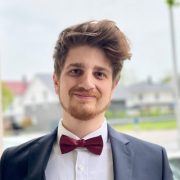Paul-David Zuercher
Research Interests
Paul’s research interests include autonomous systems, immersive technologies and human-robot collaboration.
Publications
- Zuercher, P.D., Bohné, T., Eger, V.M., and Mueller, F. (2022) Optimising virtual reality training in industry using crowdsourcing. Proceedings of the 12th Conference on Learning Factories (CLF 2022).
- Bohne, T., Heine, I., Mueller, F., Zuercher, P., & Eger, V. (2023) Gamification intensity in web-based virtual training environments and its effect on learning, IEEE Transactions on Learning Technologies, 16(5), pp.603-618.
- Farr, A., Peitschmann, L., Zuercher, P., & Bonhe, T. (2023) Skill retention after desktop and head-mounted-display virtual reality training, Experimental Results, 4(2), 2023.
- Pietschmann, L., Zuercher, P.D., Bubik, E., Chen, Z., Pfister, H., & Bohné, T. (2023) Quantifying the Impact of XR Visual Guidance on User Performance Using a Large-Scale Virtual Assembly Experiment. Research Gate Pre-print.
- Zuercher, P.J., Bohné, T., & Hanheide, M. (2023) Augmenting Strawberry Agronomy: From Systematic Literature Review to Value Flow Map⋆, Pre-print.
- Zuercher, P.J. (2023) Evaluating hardware differences for crowdsourcing and traditional recruiting methods, arXiv pre-print.
Presentations
- 12th Conference On Learning Factories (CLF) 2022: Optimising virtual reality training in industry using crowdsourcing.
Posters
- AgriFoRwArdS CDT Annual Conference (2022): Augmenting autonomous systems to improve agronomy effectiveness.
- The Towards Autonomous Robots and Systems (TAROS) Conference 2023 / CDT Annual Conference / Joint Robotics CDT Conference (September 2023): Optimising Immersive Assistance Systems for Managing Automated Manufacturing Operations with Limited Resources.
Other Activities
- Committee member of IEC’s and ISO’s Joint Technical Commission for Information Technology and Digital Twins.
- Member of the Institute for Manufacturing First Year PhD Conference 2023 Conference organising committee.
About me
I was born in Germany and lived there for the majority of my life. Since I was eight years old, I knew that I wanted to become a Computer Scientist. Therefore, there has only ever been a rather vague line between my career and my passions.
In the last four years, I split my time between working at a human-aid organisation (Engineers without borders, Germany), founding a start-up to leverage potentials of autonomous systems in logistics, studying Computer Science at the TU Darmstadt, researching with University of Cambridge’s Cyber-Human Lab (CHL) on immersive technologies and dancing salsa with friends.
In every step of this, I have tried to work towards a fair, more sustainable world, and I’m glad to be part of a cohort with the same ambitions.
I founded a start-up to make the capabilities of the fourth industrial revolution accessible to a broader range of people. And now I’m joining AgriFoRwArdS to make my contribution towards the fourth agricultural revolution.
I’m looking forward to ambitious projects with high impact, solving challenges with modern methods and joining our passionate cohort in an – for me – uncharted environment.
Subsequently, I’ll take the developed expertise to the CHL, where I’ll complement prior findings as part of my PhD.
MSc Project
Augmenting autonomous systems to improve agronomy effectiveness
Current agronomy mostly relies on heuristics yielding often inaccurate and ineffective decision making processes. Leveraging the available information of autonomous systems (AS) is an integral part of more effective decision making in agronomy. A literature review and observation study exposed the challenges of agronomists: having distributed responsibilities but facing intransparentAS that prevent effective decision-making. Based on the qualitative insights, we synthesised guidelines and create a virtual environment enabling agronomists to prioritise their actions globally and make effective decisions through interactive systems for remote analysis and evaluation of fields.
PhD Project
Low-cost interactive systems to optimise operator performance in the agri-food industry
This project focuses on how immersive technologies such as virtual and augmented reality can be used to optimise large-scale up-skilling. One of the major advantages of these digital training approaches compared to traditional up-skilling approaches such as classroom-based or paper-based instructions is that the entire learning environments is designable. This means it is possible to run experiments and simulations with real users to optimise learning outcomes. Paul’s project will build on his background in computer science and investigate how such an approach could be built. The aim is to explore the potential and feasibility of largely automated solutions allowing faster, cheaper and more scientifically robust optimisation of large-scale up-skilling in industry.
Paul’s PhD project is being carried out with primary supervision by Dr Thomas Bohné.

